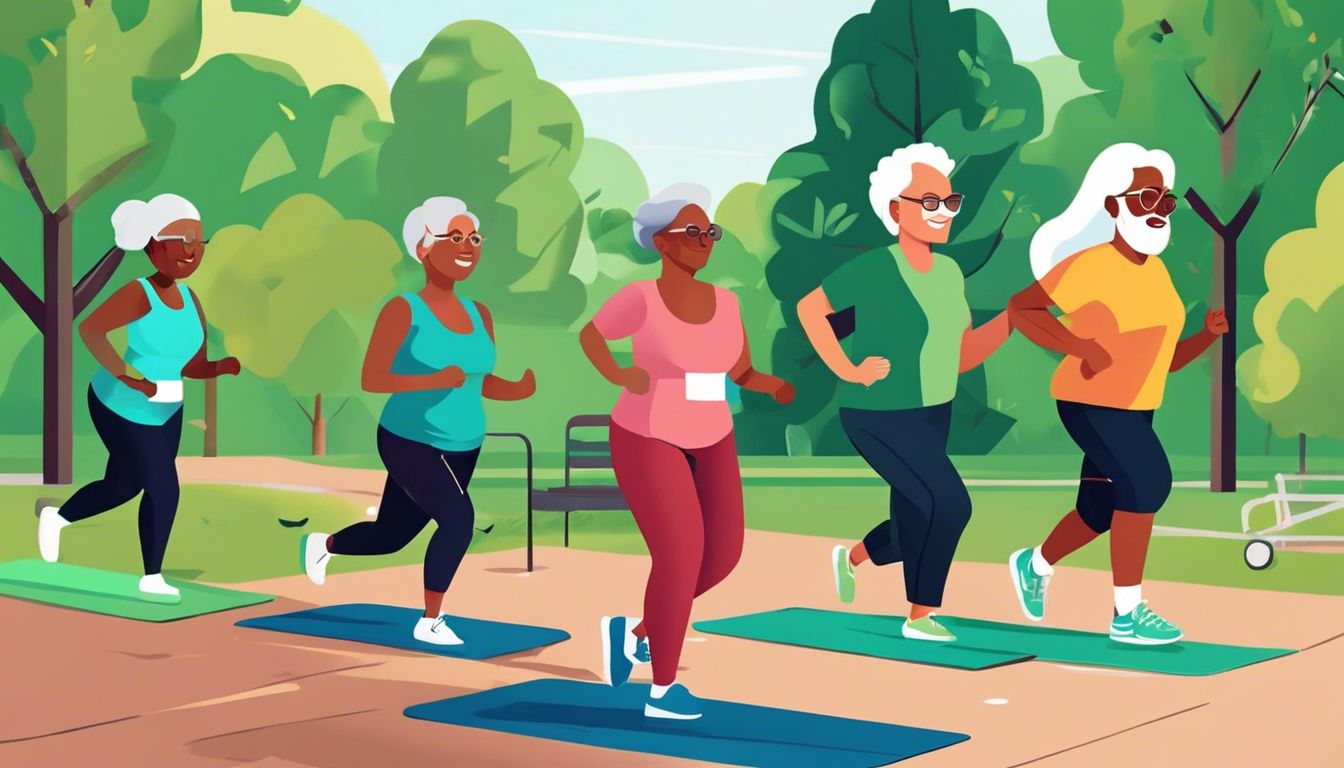As we age, many of us worry about memory loss and cognitive decline. Over 55 million people worldwide live with dementia, affecting 9.9% of adults aged 75-84 and 29.3% of those 85 and older.
This article outlines practical strategies for seniors to maintain brain health and reduce dementia risk. Learn how simple lifestyle changes can make a big difference in cognitive function.
📋✅
- Regular exercise, like 150 minutes of moderate activity per week, boosts brain health and lowers dementia risk in seniors.
- Following the MIND diet, rich in whole grains, leafy greens, and fish, helps protect cognitive function as you age.
- Getting 7-9 hours of quality sleep nightly supports memory and brain health in older adults.
- Engaging in mentally challenging activities, such as puzzles or learning new languages, stimulates brain function and slows cognitive decline.
- Managing chronic conditions like diabetes and high blood pressure is crucial, as they significantly impact cognitive health in seniors.
Key Lifestyle Changes for Cognitive Health

Lifestyle changes can protect brain health and lower dementia risk. Simple habits like exercise, eating well, and getting enough sleep make a big difference.
Engage in regular physical activity
Regular physical activity boosts cognitive health in seniors. The CDC recommends 150 minutes of moderate-intensity exercise weekly for adults 65 and older. Activities like brisk walking, swimming, or cycling increase blood flow to the brain, enhancing mental function.
Strength training exercises, such as weight lifting or resistance bands, also contribute to overall brain health.
A balanced exercise routine combines aerobic activities with strength training for optimal cognitive benefits. Incorporating physical activity into daily life, such as taking stairs instead of elevators or gardening, can help seniors meet recommended exercise goals.
The next section explores how a nutrient-rich diet supports brain health in older adults.
Follow a nutrient-rich diet
A nutrient-rich diet forms the cornerstone of cognitive health for seniors. The MIND diet, combining elements of Mediterranean and DASH diets, shows promise in reducing dementia risk.
This eating plan emphasizes whole grains, leafy greens, berries, nuts, and fish while limiting red meat and processed foods. Omega-3 fatty acids, found in seafood and certain plant sources, support brain function and may help prevent cognitive decline.
Let food be thy medicine and medicine be thy food. – Hippocrates
Antioxidant-rich fruits and vegetables combat oxidative stress, potentially slowing brain aging. Seniors should aim for a colorful plate at each meal, incorporating a variety of nutrient-dense foods.
The next key lifestyle change for cognitive health involves engaging in regular physical activity.
Prioritize quality sleep
Quality sleep is crucial for cognitive health. Adults need 7-9 hours of sleep nightly for optimal memory consolidation and brain function. Poor sleep, especially sleep apnea, increases the risk of cognitive decline.
Establish a consistent sleep schedule and create a relaxing bedtime routine to improve sleep quality. Limit screen time before bed and ensure a dark, quiet sleep environment for restorative rest.
Participate in social activities
Social engagement plays a crucial role in maintaining cognitive health. Seniors who participate in group activities, volunteer work, or community events stimulate their brains through social interaction.
These activities provide mental challenges, emotional support, and a sense of purpose. Research shows that low social support and loneliness increase the risk of cognitive decline in older adults.
Joining clubs, attending classes, or participating in group hobbies offers opportunities for seniors to stay socially active. Regular social interactions help maintain language skills, memory function, and problem-solving abilities.
Seniors can explore local senior centers, community organizations, or online platforms to find social activities that match their interests and abilities.
Mental Stimulation Strategies
Mental exercises boost brain health and slow cognitive decline. Read on to learn effective strategies.
Engage in mentally challenging activities
Mentally challenging activities boost cognitive health. Crossword puzzles, chess, and learning new languages stimulate brain function. These pursuits foster neuroplasticity, enhancing memory and problem-solving skills.
Seniors benefit from regular engagement in such activities to maintain mental acuity.
Brain training apps offer diverse cognitive exercises. Lumosity and BrainHQ provide games targeting specific cognitive domains. These tools help seniors track progress and adapt difficulty levels.
Combining digital and traditional mental challenges creates a comprehensive brain fitness regimen.
Practice mindfulness and meditation
Building on mental challenges, mindfulness and meditation offer powerful cognitive benefits. These practices increase gray matter density in brain regions associated with learning, memory, and self-awareness.
Research by Hölzel et al. confirms mindfulness practice boosts brain gray matter density. Regular meditation sessions of 10-20 minutes daily can significantly improve attention span and reduce stress levels.
Mindfulness techniques like focused breathing or body scans help seniors stay present, reducing anxiety about the future. These practices also enhance emotional regulation, promoting overall well-being and cognitive resilience in older adults.
Managing Health to Support Cognitive Function
Managing your health is key to keeping your brain sharp. Read on to learn how regular check-ups and smart lifestyle choices can boost your cognitive health.
Regular health screenings
Regular health screenings are crucial for seniors to maintain cognitive health. These check-ups detect early signs of cognitive decline and identify risk factors like high blood pressure or diabetes.
The American Academy of Family Physicians recommends cognitive screenings for individuals with a family history of Alzheimer’s or cognitive impairment. Early detection allows for timely interventions, potentially slowing the progression of cognitive decline.
Proper management of chronic conditions through these screenings plays a vital role in reducing dementia risk.
Mental stimulation strategies complement regular health screenings in promoting cognitive health.
Manage chronic conditions like diabetes and high blood pressure
Chronic conditions like diabetes and hypertension significantly impact cognitive health. Uncontrolled diabetes increases dementia risk, with 37.3 million U.S. adults affected. Proper management through medication, diet, and exercise is crucial.
Regular blood sugar monitoring and maintaining target levels help prevent complications. Hypertension treatment involves lifestyle changes and medications to keep blood pressure below 130/80 mmHg.
Patients should follow prescribed treatment plans, attend check-ups, and report any concerns to their healthcare provider promptly.
Monitor and moderate alcohol intake
Excessive alcohol consumption impacts cognitive health. Heavy drinking can lead to Korsakoff’s syndrome, affecting problem-solving and memory. Limiting alcohol intake benefits mental and physical well-being.
Seniors should follow U.S. Food and Drug Administration guidelines for moderate drinking. This means up to one drink daily for women and two for men. Reducing or eliminating alcohol helps prevent cognitive decline and dementia.
How Seniors Can Effectively Manage Multiple Chronic Conditions
Seniors with multiple chronic conditions face unique challenges. 34% of adults with cognitive decline report at least 4 risk factors, compared to 13.1% without decline. Effective management involves coordinating care across healthcare providers, adhering to medication regimens, and prioritizing lifestyle modifications.
Regular health screenings, proper nutrition, and physical activity help control conditions like diabetes and hypertension. Seniors should create a comprehensive care plan with their doctors, addressing each condition’s specific needs while considering potential interactions.
Mental health plays a crucial role in managing chronic illnesses. Nearly 50% of adults aged 45 and older have high blood pressure or fail to meet aerobic activity guidelines. Seniors can combat depression and anxiety through social engagement, stress-reduction techniques, and cognitive stimulation activities.
Support groups offer valuable resources and emotional support for those dealing with multiple health issues. The next section explores strategies for staying informed about the latest research and treatments for cognitive health.
Being Informed and Proactive
Stay informed about the latest research on cognitive health. Learn to spot false claims and seek advice from trusted medical professionals.
Identify and avoid misleading information
Misleading information about cognitive decline and dementia proliferates online. Seniors must verify health claims with reputable sources like the Alzheimer’s Association or National Institute on Aging.
Credible information relies on peer-reviewed research and clinical trials. Seniors should scrutinize miracle cures, unproven supplements, and sensationalized headlines promising easy solutions to complex health issues.
Consulting healthcare providers about new treatments or medications is crucial. Some over-the-counter drugs can negatively impact cognition. Seniors should discuss potential risks and benefits with their doctors before starting any new regimen.
Reliable information empowers seniors to make informed decisions about their cognitive health and reduce dementia risks through evidence-based strategies.
Understand the role of genetics and environment in dementia
Building on the importance of identifying reliable information, understanding the interplay of genetics and environment in dementia is crucial. Genetic factors contribute to dementia risk, but environmental influences play a significant role.
African Americans face twice the incidence and prevalence of Alzheimer’s disease and related dementias (ADRD) compared to non-Hispanic White Americans. This disparity stems from a complex mix of genetic predisposition and higher rates of chronic diseases.
Lifestyle choices, such as diet, exercise, and cognitive engagement, can modify genetic risk. Managing health conditions like diabetes, heart disease, and high blood pressure is essential for reducing dementia risk across all populations.
Conclusion
Seniors can significantly boost their cognitive health through simple lifestyle changes. Regular exercise, a balanced diet, and quality sleep form the foundation of brain wellness.
Mental stimulation and social engagement keep the mind sharp and resilient. Proactive health management, including regular check-ups and addressing chronic conditions, supports long-term cognitive function.
By adopting these strategies, older adults can maintain their mental acuity and reduce dementia risk.
For more tips on staying healthy, check out our guide on how seniors can effectively manage multiple chronic conditions.
FAQs
1. What diet helps seniors maintain brain health?
A Mediterranean-style diet rich in plant-based foods supports cognitive health. This eating pattern includes fruits, vegetables, whole grains, and lean proteins like fish and eggs. It may reduce the risk of Alzheimer’s disease and vascular dementia.
2. How does exercise benefit seniors’ mental processes?
Regular physical activity, including aerobic exercise and resistance training, boosts cardiovascular health and cognitive reserve. It helps prevent obesity, stroke, and high blood sugar, which are risk factors for dementia.
3. Can lifestyle changes reduce dementia risk?
Yes. Quitting smoking, limiting alcohol intake, and managing chronic stress can lower the risk of cognitive decline. These changes also prevent smoking-related illnesses and improve overall health.
4. What role does social activity play in brain health?
Engaging in social activities helps maintain cognitive function. It stimulates mental processes, builds memories, and may delay the onset of dementia symptoms in people living with the condition.
5. How does hearing loss affect cognitive health?
Untreated hearing loss is linked to an increased risk of dementia. Regular hearing checks and using hearing aids when needed can help maintain cognitive function and social engagement.
6. Are dietary supplements beneficial for brain health?
While a balanced diet is crucial, some seniors may benefit from specific supplements. Consult a doctor before taking multivitamins or other supplements, as their effects on cognitive health vary among individuals.









